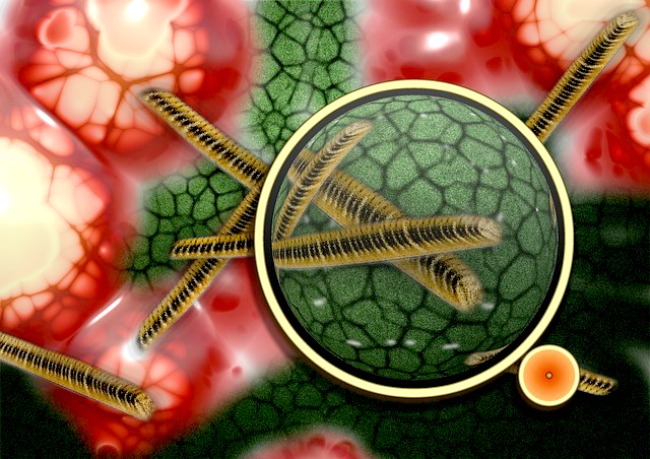Bacteria Test Kits May Be Able To Soon Assess Cancer Risk
Microbes are major actors in biological environments and play critical roles in both the prevention and advancement of disease. Cancer diagnosticians may soon be able to predict key genetic mutations with simple test kits which analyze specific gut bacteria linked to different types of cancers.
Beneficial bacteria in the gut are known to attack pathogens, manufacture vitamins and even act as anti-cancer agents. Recent research has strengthened the scientific understanding that microbes that live in your gut may affect what goes on in your body and an expanding body of evidence now supports a role for gut microbes in the etiology of cancer.
Trillions of bacteria are hostile and can cause disease, while many others are friendly and have established a symbiotic, mutually beneficial relationship with us over the millennia. These friendly bacteria have also been referred to as “probiotics” and are being used increasingly by mainstream clinicians for both preventive and therapeutic purposes.
Widget not in any sidebars
The effectiveness of certain cancer therapies may depend on microbes that live in the intestine, and previous findings suggest that antibiotics used to treat infections might hinder the effects of anti-cancer therapies. After antibiotic treatment the bacterial composition in the gut never returns to its initial composition which should give medical specialists a warning regarding the overuse of such treatments.
The human gut harbors a complex community of microbes, collectively called microbiota. Gut microbes can influence both local and body-wide immune system activity and inflammation. Bacterial populations have co-evolved with humans over millions of years, and have the potential to help us adapt to new environments and foods. “Co-resident microbes are our ‘old friends’ that help us adapt to different lifestyles and environments”, says Amanda Henry, leader of the Max Planck Research Group on Plant Foods in Hominin Dietary Ecology.
Microbiota on the mucosal surfaces of the gastrointestinal (GI) tract greatly outnumbers the cells in the human body. Recent data implicate dysregulated host responses to enteric bacteria leading to cancers in extra-intestinal sites. Together these findings point to novel anti-cancer strategies aimed at promoting GI tract homeostasis.
Today, exhaustive quantitative and qualitative evaluation of all environmental factors is not possible. Various environment-induced diseases have been characterized based on colon microflora. Growing data have shown specific changes in microflora (i.e. dysbiosis) in the stools of patients with colon cancer or those adherent to the colonic mucosa.
About 16% of cancers around the world have been estimated to be caused by microbes and several cancers in the liver and gastrointestinal tract are clearly identified as being microbe related. Our good understanding of the physiology and pathophysiology of the gastric f unction in relation to a single microorganism has made it possible to better understand human gastric carcinogenesis.
unction in relation to a single microorganism has made it possible to better understand human gastric carcinogenesis.
Predicting Cancer Through Colorectal Bacteria
Led by Ran Blekhman, PhD, Assistant Professor of Genetics, Cell Biology, and Development at the University of Minnesota and senior author on the study, the researchers examined the genetic differences between colorectal tumor cells and healthy colon cells from 44 adults with colorectal cancer. They looked for correlations between specific mutations in the tumor cells and the composition of the tumor microbiome — the types of bacteria present in the tumor’s immediate environment and their relative abundance — and found relationships between the two.
“It’s safe to suggest that we may have bacterial testing kits for home users in less than 5 years which could accurately assess cancer risk,” said oncologist Dr. Jamil Kusher commenting on the study and current research trends.
“Ours was the first study to analyze both of these factors together,” said Michael B. Burns, PhD, a postdoctoral researcher in Dr. Blekhman’s laboratory. “Previous studies have found associations between certain mutations and colorectal cancer, and between certain microbiome characteristics and cancer, but had not integrated the two,” he explained.
The researchers found that in general, the more cancer-associated mutations a person’s tumor cells had, the more varied his or her tumor microbiome was. In fact, specific mutations in tumor cells were associated with the presence of specific types of bacteria in the microbiome. Together with Dan Knights, PhD, Assistant Professor of Computer Science and Biotechnology at the University of Minnesota, Dr. Blekhman and colleagues developed a method to predict the types of mutations present in a tumor based on its microbiome. On average, the method correctly predicted about half of the most common mutations found in the tumor.
“We found that it could be possible to genetically classify the colorectal tumor a person has without having to do a biopsy and dissect it,” Dr. Blekhman said. “This could eventually provide a non-invasive and inexpensive approach to inform diagnosis and treatment.”
 “By studying interactions between tumors and the bacteria in their microbiomes, we would better understand the bacteria’s role in causing tumors to form and grow — if they even have such a role — and eventually, we may be able to treat cancer by changing aspects of its microbiome,” Dr. Blekhman said.
“By studying interactions between tumors and the bacteria in their microbiomes, we would better understand the bacteria’s role in causing tumors to form and grow — if they even have such a role — and eventually, we may be able to treat cancer by changing aspects of its microbiome,” Dr. Blekhman said.
Functional contributions of the gut microbiota that may influence cancer susceptibility in the broad sense include (1) harvesting otherwise inaccessible nutrients and/or sources of energy from the diet (i.e., fermentation of dietary fibers and resistant starch); (2) metabolism of x
enobiotics, both potentially beneficial or detrimental (i.e., dietary constituents, drugs, carcinogens, etc.); (3) renewal of gut epithelial cells and maintenance of mucosal integrity; and (4) affecting immune system development and activity. Understanding the complex and dynamic interplay between the gut microbiome, host immune system, and dietary exposures may help elucidate mechanisms for carcinogenesis and guide future cancer prevention and treatment strategies.
Sources:
aacrjournals.org
ncbi.nlm.nih.gov
sciencedirect.com
nih.gov
Dr. Marianna Pochelli is a Doctor of Naturopathic Medicine specializing in the treatment of disease through superfoods and herbal strategies. She actively promotes detoxification, colon cleansing, and a vegetarian lifestyle using living foods as a platform to health. This post appeared at Prevent Disease


